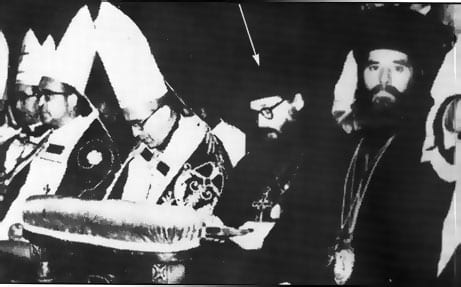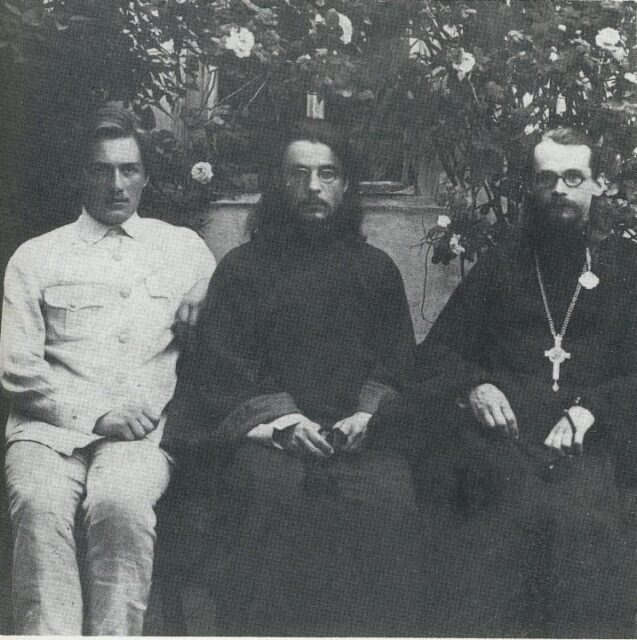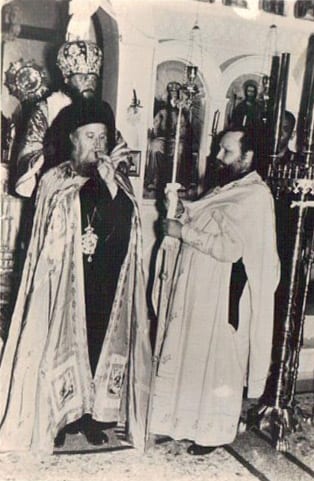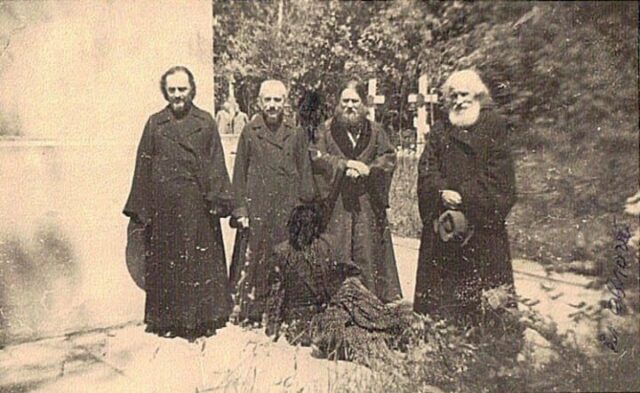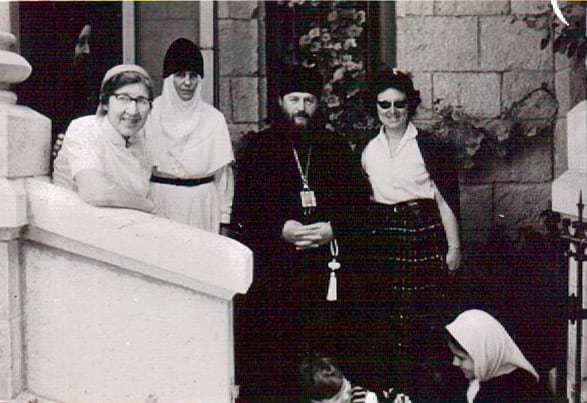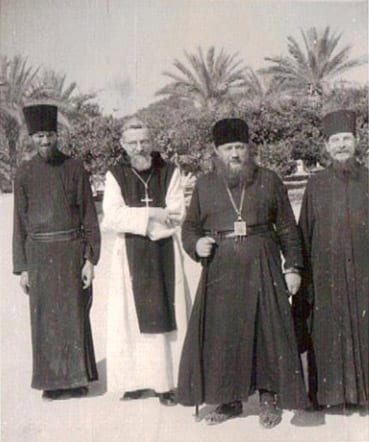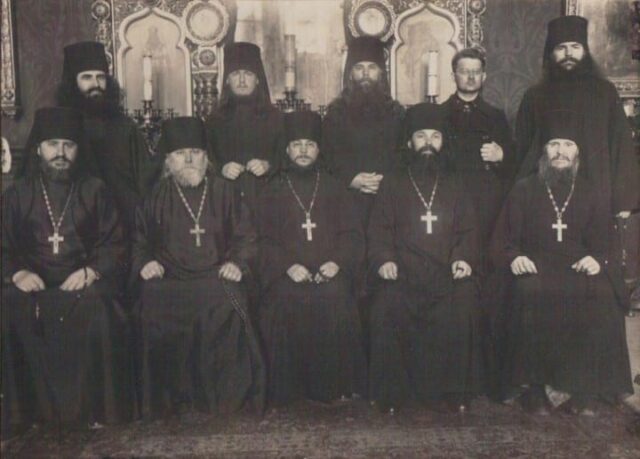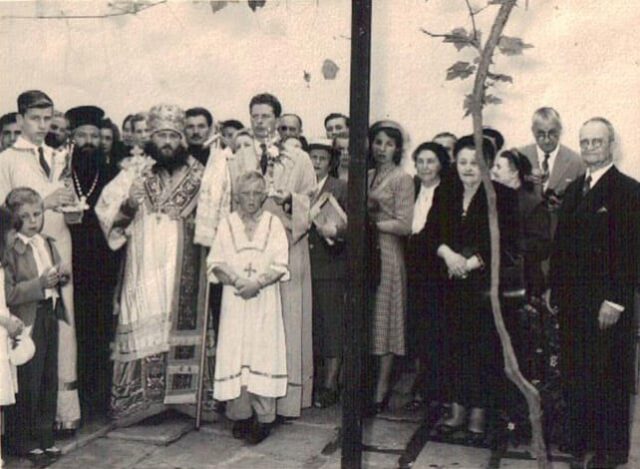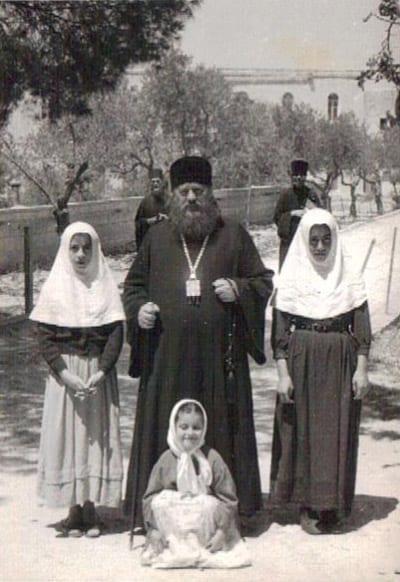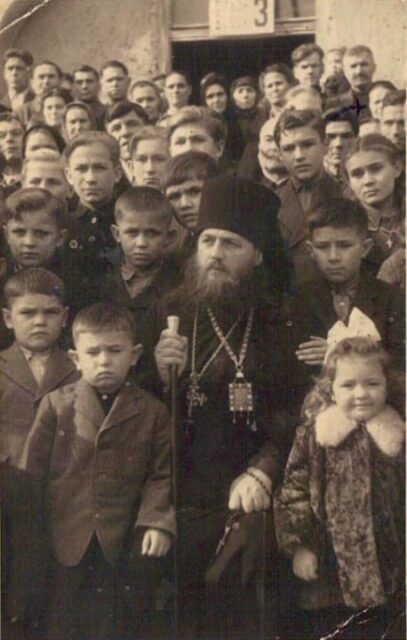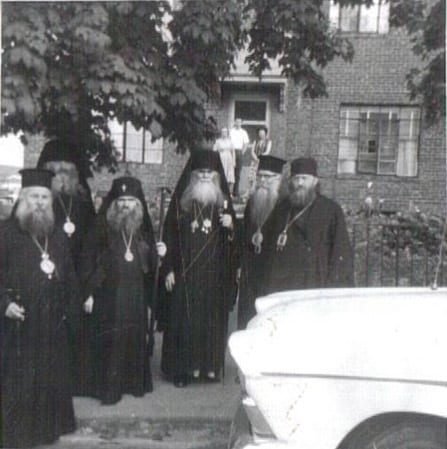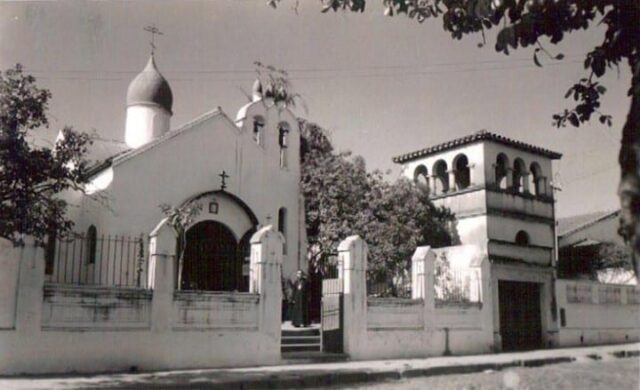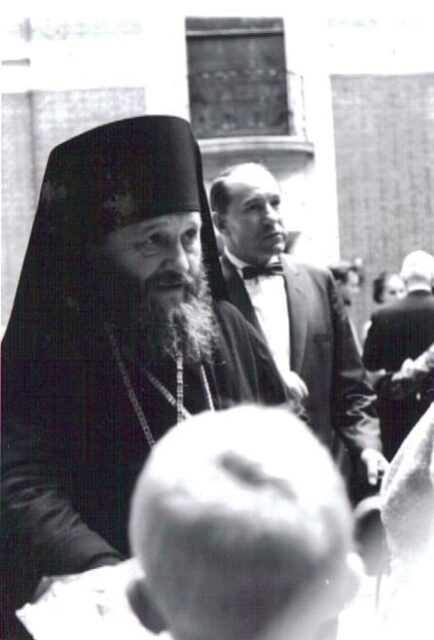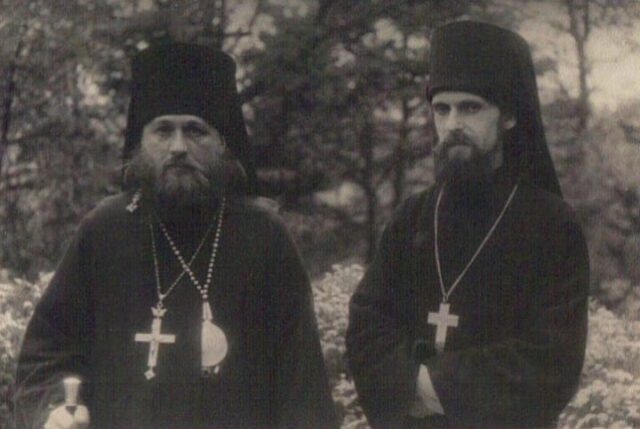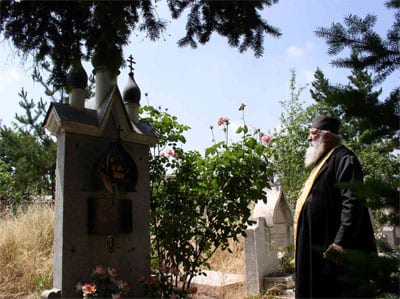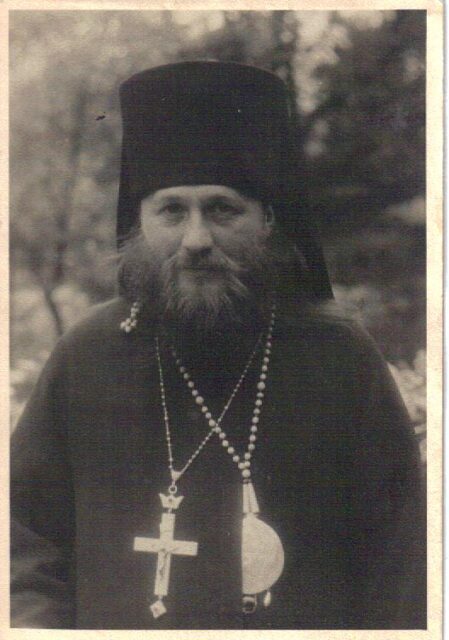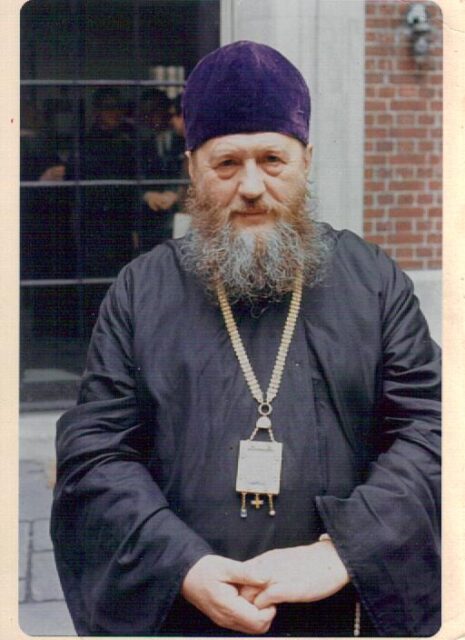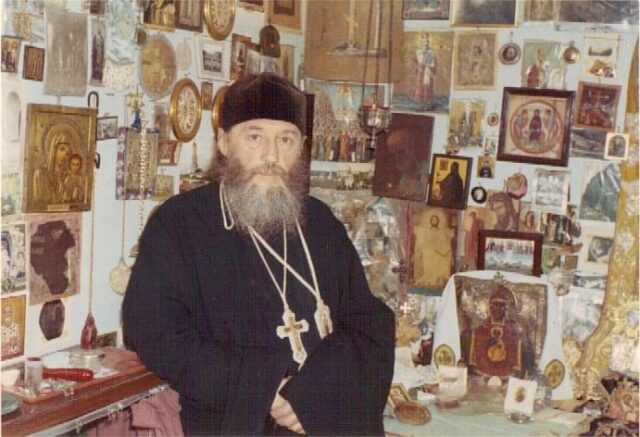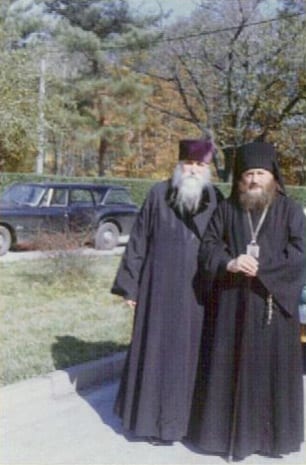Introduction [1]This paper was presented as oral history project for Prof. John Erickson’s Church History-461 at St. Vladimir’s Orthodox Seminary (2002)
In 1991 I came across an article dedicated to Archbishop Leontii representing him as a mysterious hierarch who in Russia had belonged to the Catacomb Church. The article was printed in the July – August,1981, issue of The Orthodox Word. As a recent convert to the Russian Church Abroad, I was very much fascinated by everything related to the Catacomb Church and decided to prepare an article for Orthodox Russia the bi-weekly periodical of Holy Trinity Monastery in Jordanville. That year was the twentieth anniversary of the death of Archbishop Leontii of Chile. Sicne I did not find enough material for the article, I missed all publication dates and decided to take the biography of Archbishop Leontii as a subject for my Bachelor thesis for Holy Trinity Seminary. In the course of my work, I interviewed various people and I would like to provide here several excerpts from their accounts. All interviews were conducted in Russian. In my interviews I tried to find out how my respondents remembered the archbishop. For instance I asked the following questions: “How do you remember the archbishop, and how would you describe him in a few words?”
Vladyka Leontii was a difficult person, but since my time is limited in 25 minutes I consider it wrong to concentrate on the negative features of his character. It must be said that there was indeed such an aspect to his character, but I would prefer to concentrate on those features that were more positive.
I also need to provide here a brief historical background.. Before 1939 on the whole territory of the Soviet Union there were only about one hundred open churches. In the course of the German attack on the Soviet Union in 1941, huge European parts of the country were occupied. The territories which were controlled by the Germans experienced religious revival. Churches were opened everywhere and dioceses were established. On August 18, 1941 by the decision of the bishops of Ukranian Autonomous Church (under the Moscow Patriarchate) Archimandrite Leontii was ordained Bishop of Berdichev.
When the situation had changed in favor of the Soviet Army, thousands upon thousands of people decided to leave their native land along with the retreating German troops. They were afraid to pass through new circles of the communist repressions such as they had survived before the war. Among them was Bishop Leontii of Berdichev . All the episcopate of the Bielorussian Church of the Moscow Patriarchate left the country and joined the Russian Church Abroad. Bishop Leontii joined the Russian Church Abroad along with the Bishops of the Ukrainian Autonomous Church and was assigned to Paraguay.
Paraguay[2]The plot of The Mission with Robert de Nero is quite an accurate account of the history of Paraguay.
Recollections of Archimandrite Benjamin a rector of the Russian parish in Santiago, Chile. Since 1943 and until the death of Archbishop Leontii in 1971, Archimandrite Benjamin lived most of the time with the archbishop. Fr. Benjamin was sixteen years old when he came to the monastic brotherhood of Bishop Leontii in Zhitomir, Ukraine. He came from a humble Ukrainian family. This interview with Fr. Benjamin was conducted in Holy Trinity Monastery in Jordanville during Great Lent of 1993 and was used for my Bachelor thesis published in Pravoslavnaya Zhizn’ (3-5), 1996.
After the end of World War II, the Synod of the Bishops of the Russian Church Abroad relocated to Munich. At that time Western Germany was full of refugees from the Soviet Union who did not want, or were afraid to return to the “Stalinist paradise.” Bishop Leontii received his assignment for Paraguay in 1945 and in 1946 he with Fr. Benjamin arrived in Buenos Aires.
The peasants had all material necessities, but they were unable to sell their products. The local market was very limited and the state law did not allow the export of anything. They would have two-hundred year laws there, which for instance demanded customs taxes paid in gold coins. Life was, very primitive back there — even the soldiers were barefoot.
When we arrived in Paraguay, [in the area on the board with Argentina, near Encarnacion] there were in the parish only simple people mostly from Poland. The colony where we lived was called Capitan Miranda and still exists. We survived by what we could plant in the vegetable garden. The peasants did not help us. […] The general attitude was: “You should support yourselves as we do.” Among the peasants many where under the influence of the Soviet or Ukrainian nationalistic propaganda. When we started to tell what the Soviet Army did, they did not trust: ”You were collaborationists, you worked with Nazis.” But later, when peasants saw how we lived and worked, they started to treat us very well, but still did not want to give us any funds. I made prosphoras and cleaned the church and was paid 20 guarani (a few dollars) a month: Five kilos of bread costs that much. The Bishop was not paid at all.
Vladyka considered transferring to Canada at the time when Archbishop Joasaph was assigned to Argentina, but even if we could have obtained Canadian entree visas, we never would have been able to collect money for the tickets. Nobody could accumulate money in Paraguay.
There were other clergy in Paraguay, but unfortunately in such circumstances they had degenerated. They were lonely and the Bishop tried to accept them into our monastic Brotherhood, but it was difficult since they had already reached the point when it is very difficult to come back …
Vladyka received assignment for Paraguay as a vicar Bishop of Archbishop Theodosy of Brazil[3]Before the WWII all Russian parishes in South America except the Argentina were under the jurisdiction of Archbishop Theodosy. The parishes in Chile were exempted from his jurisdiction in 1953. In … Continue reading. Bishop Leonty was allowed to govern only a part of the Paraguay. The capital of the country — Asunción was still under Archbishop Theodosy. Archbsihop Theodosy considered that Synod gave him extraordinary rights over the South America. He met with Bishop Leonty in Brazil and assigned him for Argentina. They decided to establish the South American metropolitan district with the promotion of the Archbishop Theodosy into the rank of Metropolitan. The Synod did not approve this plan and commanded Bishop Leonty to stay in Paraguay. He became upset and joined Protopresbyter Constantine Izrastsow of Buenos-Aires who a few years earlier had left the Russian Synod for the North American Metropolia. That was in 1950. Nevertheless he did not stop commemorating the name of the first hierarch of the Russian Church Abroad. When Bishop Leonty was forbidden to serve by the Synod of Bishops he accepted it and ceased serving. [This suspension bothered his conscience — A. P.] He repented and returned to Paraguay. In 1951 Bishop Leonty with Fr. Benjamin left Paraguay. [4]Now it is an empty place where they lived. The Church in Encarnacion, a border town with Argentina, is now the only Church which is still with the Synod, although there are around seven other … Continue reading
Chile
Recollections of Sergei Ilich Tkachevski, former warden of Kazan icon church in Newark, New Jersey. He was born in Poland in the family of a Russian officer. He lived in Chile from 1951 until 1961 and his father became a deacon of Archbishop Leonty. The interview was conducted in 1998 in Newark, NJ. The excerpts from the interview never published before.
Before World War II Russian immigrants from France came to Chili. Along with them was Fr. Iliodore. They built Holy Trinity Church. Among those emigrants were a lot of soloisits, but the people loved Vladyka Leonty. The church and house were built on the land of the church warden. Vladyka Leonty was loved by many rich Libanonese and Palestinians and they helped to him financially. On the third day of Pascha he always visited his parishioners. He did the same on the name days of the parishioners.
In 1952-53 the Russians from China — Harbin, Shanghai– arrived. The parish and the choir expanded. In Santiago at that time there were up to 9-10 thousand Russians [5]Actually no more than one thousand in all Chile.. In 1957-58 a piece of land was bought and consecrated for the Russian Orthodox Cemetery.
Vladyka demanded of the Church servers that they should participate in the mystery of repentance three times a year. Sergei Ilich was one of those acolytes and he has now served thirty years in the parish in Newark and all of Vladyka’s other acolytes are still with the Church. He described the Archbishop in a few words as: young, smart and decided.
The Miscellaneous Memories
Of Archimandrite Benjamin [published in the above mentioned periodical Pravoslavnaia Zhizn’]: Archbishop Leonty sometimes was mistakenly taken for Metropolitan Leonty who was at the same time first hierarch of the North American Metropolia. Metropolitan Leonty used to write poems, but not Archbishop Leonty. Vladyka came to Argentina in 1969. Many Russians had fled there from the Communist threat. In 1971 Aliende was elected as a president. Vladyka never refused to receive anyone into the Orthodox Church, although he did not himself undertake special missionary activity.
Vladyka did not give special spiritual instructions. To young people he used to say that everyone should fulfill the Christian commandments. He said: We cannot say that now we will live according to the spirit of our time and will repent later. It is an absurdity.
Sometimes he had difficult relations with the old emigration. They saw all who fled from the Soviet Union as Soviets and were very careful in regard to new comers.
The recollections of the Orthodox Chilean Vladimir Barros a graduate from Holy Trinity Seminary in Jordanville, NY, has never published before, written during conversations in New York in 2002. Vladimir was received in Orthodoxy in 1960 in Santiago by Archbishop Leonty. In Santiago Vladimir belonged to both the Russian and Arabic Churches.
Most of the Arabs arrived from Palestine after the foundation of the state of Israel [6]Approximately at that same time there arrived from Jordan a group of nuns. This group of nuns had left their convent sometime after 1945 when the the main part of their Gornensky convent near … Continue reading. Vldayka Leonty was the only hierarch of the Russian Church Abroad in South America, before the recent times, who knew the Spanish language. His church was located in the Arabic quarter near the Arabic parish. Once Vladimir came to the Arabic parish on a Sunday right after a scandal had happened just before the liturgy. The priest had become so upset with somebody that he had hit him. People run to Archbishop Leonty and he arrived with his subdeacons all of them were already vested. He defrocked the priest for a month. The Arabs did not have a bishop in Santiago; therefore, Vladyka was not sure how the Arabic Bishop in Buenos-Aires would consider such intervention, but it was fine and he appreciated it.
Vladimir Andrushkevich: Vladyka Leonty wanted with every breath to serve the Church. My oldest son was very large and uncoordinated. He might step on the priest’s foot, drop the cross, the staff etc. I did not let him go to serve, but Vladyka Leonty forced him to serve during the Bishops’ service. And my wife and I watched in horror, how he stepped on the Bishop’s mantle. I said: “Vladyka, please do not take Kolia to be an acolyte, he is not fit for this role.”
Vladyka replied: “It is does not matter, everybody fits. We in Russia [during persecutions] had to take everybody.” Once we had been waiting at an airport for somebody. Suddenly there came three Englishman in pretty clean clothes with uncut hair and huge beards. Bishop Leonty exclaimed: “Wow! They would be such good priests.” I said to him: “Vladyka! They are — hippies.” “It is does not matter. If we would talk to them they may become priests.”[7]Of course such approach had a negative effect. For instance Vladyka ordained Juan Bodenburg to priesthood. Once he came to him excitingly explaining how nice it was to serve a liturgy on a beach for … Continue reading
Matushka Martha Iwaszewich: Once I asked Vladyka, what should I do — children take much of my time from serving the Church. Vladyka answered: Your first responsibility before God is the family, the children. When they grow up, then you can especially dedicate yourself to the parish. When guests visited the Archbishop, he did not allow them to do anything, like prepare tea for instance. He said: I am a Bishop in all spheres. He meant that he knows not only the Church business. When they built something, he was the first to begin work, no matter that he came to Argentina with a bad heart and poor blood circulation. On other hand, he did not allow anyone to disrespect his hierarchal rank. Vladyka provided help to the needy in a humble way. When he served, we sensed that he is a Bishop. He loved that the hierarchical services should be done properly. When he made a cross with the dikyri and trikyri it seemed that he was drawing a cross on paper. He often sang in the choir. He could sing as a first or second tenor. He taught Argentineans who became the members of the Orthodox Church how to sing. He tried to do whatever was necessary to make the melodies of the Octoikh compatible with the Spanish translations. He did not serve in Spanish, but he approved of missionary activity.
Matushka remembered the following instructions of Archbishop Leonty: We are members of the Church, we live in the Church with the purpose to serve God and to save the soul. Everyone should mind his own business and not interfere with matters that are not his responsibility. Everybody in church should do his own obedience. When one parishioner makes comments to another, that person could become upset, but if the warden of the parish would say the same, nobody would be upset since it is his obedience. It needs be to said that Vladyka himself took responsibility for every matter in Church, even those outside his direct jurisdiction.
References
| ↵1 | This paper was presented as oral history project for Prof. John Erickson’s Church History-461 at St. Vladimir’s Orthodox Seminary (2002) |
|---|---|
| ↵2 | The plot of The Mission with Robert de Nero is quite an accurate account of the history of Paraguay. |
| ↵3 | Before the WWII all Russian parishes in South America except the Argentina were under the jurisdiction of Archbishop Theodosy. The parishes in Chile were exempted from his jurisdiction in 1953. In this year a new diocese of Chile was founded and Archbishop Leonty became the only Bishop for this diocese. — A.P. |
| ↵4 | Now it is an empty place where they lived. The Church in Encarnacion, a border town with Argentina, is now the only Church which is still with the Synod, although there are around seven other Orthodox churches in this area which are with various Ukrainian jurisdictions.Source. |
| ↵5 | Actually no more than one thousand in all Chile. |
| ↵6 | Approximately at that same time there arrived from Jordan a group of nuns. This group of nuns had left their convent sometime after 1945 when the the main part of their Gornensky convent near Jerusalem decided to join the jurisdiction of the Moscow Patriarchate. With the blessing of Archbishop Leonty they established the orphanage of St. John of Kronstadt that exists in today in the suburbs of Santiago Arayan and has a day school accredited by the Chilean government. A.P. |
| ↵7 | Of course such approach had a negative effect. For instance Vladyka ordained Juan Bodenburg to priesthood. Once he came to him excitingly explaining how nice it was to serve a liturgy on a beach for Arab people. Vladyka, asked: “Wait, wait how did you serve, did you have an antiminsion? — “No, I used my handkerchief.” “What?! “ — Vladyka became very upset with Padre Juan and he left for the Moscow Patriarchate and become their exarch for Chile. But he did not explain to him how to do things properly. If he wanted something it had to be done. No matter what is the price. — A.P. |

